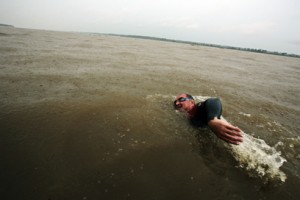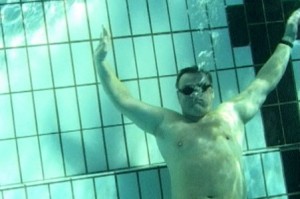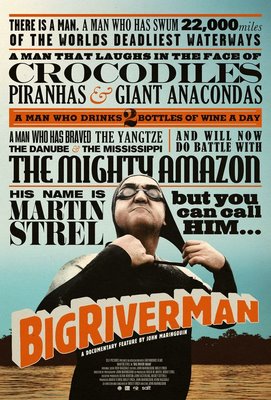Directed by John Maringouin
He’s an overweight 53-year-old man who used to be a professional gambler. He now teaches flamenco guitar for a living. He regularly drinks and drives, eats horse burgers, and spends his days in underground caves learning how to think like an animal. He is also ‘the world’s last superhero.’ Meet Martin Strel, aka Big River Man.
Strel is hardly typical of most heroes, but as far as documentary subjects go, he’s a fine choice. Having taught himself to swim at the age of 6, Martin made the decision to become a marathon swimmer in his mid-30s, and has since set numerous world records. You wouldn’t know it to look at him. His gut is large, and his thirst seemingly unquenchable – Strel drinks two bottles of wine a day whilst swimming, and much more besides when he’s on dry land. But over his aquatic career he has garnered a large, worldwide following, becoming a superstar in his native Slovenia and far beyond. Having already swum the full-length of the Danube, Mississippi, and Yangtze rivers, in February 2007, Martin decided to tackle the largest and most dangerous of them all: the Amazon.
 John Maringouin’s film follows the undertaking through several months of preparation, the swim itself, and the after-effects on those involved. In the first act we are introduced to this most eccentric of lead characters. We see Martin as he undergoes rigorous physical training (swimming more than 5 hours per day), spends his summer in a nearby underground cavern (believing that if he can think like an animal, he won’t be eaten by one on his journey), and goes about his business as a national treasure in his homeland (appearing in films, glad-handing dignitaries, and judging beauty pageants).
John Maringouin’s film follows the undertaking through several months of preparation, the swim itself, and the after-effects on those involved. In the first act we are introduced to this most eccentric of lead characters. We see Martin as he undergoes rigorous physical training (swimming more than 5 hours per day), spends his summer in a nearby underground cavern (believing that if he can think like an animal, he won’t be eaten by one on his journey), and goes about his business as a national treasure in his homeland (appearing in films, glad-handing dignitaries, and judging beauty pageants).
Narrated by Strel’s son Borut, it is fascinating to see this human fish out of water, and to try and piece together the motivation behind his incredible endurance feats. Previously Strel has stated that his swims are undertaken in order to raise awareness of the dangers of water pollution (the Yangtze, which he swam in 2004, is the world’s most polluted river), whilst the Amazon expedition is to focus attention on the destruction of the rainforest. Nobel as these intentions are, and sincere as Strel may be about them, they do at times seem incongruous with the man at large; even Borut seems unsure of exactly how his father’s exertions will have the desired effect. But regardless, the footage is intimate and revealing, and these opening scenes are the film’s strongest.
 The swim itself is as grueling as one would expect – and then some. Once again we are kept involved in the action, and the physical and emotional tolls which affect not only Strel himself but those around him are well presented. The vast river stretches out like a seemingly insurmountable obstacle, and the dangers to anyone foolish enough to take a dip are clear to see: crocodiles, piranhas – even the candiru fish which, as Borut delightfully explains, ‘swims up your penis. And if it does – no more penises!’ Fortunately none of these things interfere with this incredible display of human endurance, but the exertions do eventually have a severe effect on Strel’s mental and physical wellbeing.
The swim itself is as grueling as one would expect – and then some. Once again we are kept involved in the action, and the physical and emotional tolls which affect not only Strel himself but those around him are well presented. The vast river stretches out like a seemingly insurmountable obstacle, and the dangers to anyone foolish enough to take a dip are clear to see: crocodiles, piranhas – even the candiru fish which, as Borut delightfully explains, ‘swims up your penis. And if it does – no more penises!’ Fortunately none of these things interfere with this incredible display of human endurance, but the exertions do eventually have a severe effect on Strel’s mental and physical wellbeing.

– Joel Gregory

